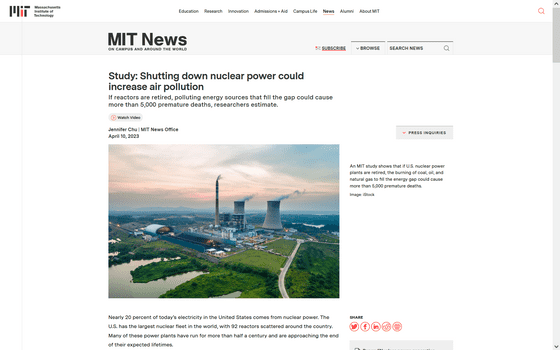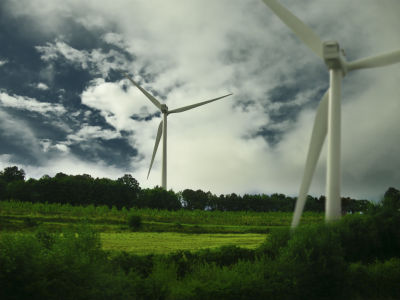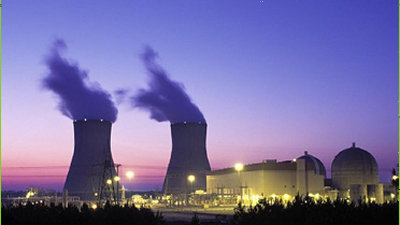Stopping nuclear power plants could kill more than 5,000 people every year due to air pollution

As of 2023, nuclear power will have a relatively low usage rate among all power generation methods. The aging of old power plants is also viewed as a problem, but the Massachusetts Institute of Technology investigated what would happen if all nuclear power plants stopped.
Study: Shutting down nuclear power could increase air pollution | MIT News | Massachusetts Institute of Technology

In the United States, 20% of electricity is covered by nuclear power generation. In the United States, 92 nuclear reactors are scattered throughout the country, and many of these power plants have been operating for more than half a century. Nuclear power generation supports people's lives by producing a lot of energy, but discussions are also starting on how to handle aging nuclear reactors.
In response to this situation, a research team at the Massachusetts Institute of Technology draws a scenario that ``all nuclear power plants in the United States have stopped'' and considers how the resulting energy demand can be covered by alternative means such as thermal power plants. Did.

As a result of the simulation, it was found that stopping the nuclear power plant would increase the use of coal, gas, and oil to compensate for the power demand, accelerating 'air pollution'. While not surprising in itself, the researchers quantified this projection and found that increased air pollution would have a serious health impact, with the potential for 5,200 more pollution-related deaths per year. I understand
However, we must also take into consideration that countries are beginning to adopt renewable energy sources such as solar and wind power. As more renewable energy replaces existing power generation methods, it should be possible to reduce air pollution.
The research team devised a scenario that ``a lot of renewable energy will be used by 2030,'' and made a new trial assuming that the best path was taken. It turns out that death will occur.

Lyssa Freese, lead author of the study, said: 'When we think about shutting down nuclear power plants, we tend to focus on localized risks from accidents and fuel extraction, but air pollution from operating fossil fuel plants is an alternative. It is also necessary to consider that it is very harmful.'
The closure of nuclear power plants in the past has resulted in a corresponding increase in fossil fuel use. In 1985, the closure of the Tennessee Valley nuclear reactor in the United States led to a surge in coal use, and in 2012, the closure of a nuclear power plant in California led to an increase in natural gas use. Germany, which has almost completely phased out the use of nuclear power, initially increased its use of coal-fired power to fill the void.
Based on these trends, a research team at the Massachusetts Institute of Technology thought, 'How will the US energy grid change if nuclear power generation is completely abolished?'

“We knew that coal use was declining, and there had already been a lot of research done on its impact on air quality,” said Freese. None looked at power generation and air quality.If you want to think of nuclear power plants as part of the energy system, you have to think carefully about how to retire them. The increased operation of other power plants may result in increased pollution,' he said.
Related Posts:
in Posted by log1p_kr







